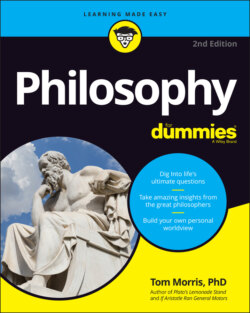Читать книгу Philosophy For Dummies - Tom Morris - Страница 59
Radical skepticism about the past
ОглавлениеThe 20th-century philosopher Bertrand Russell once posed a radical hypothesis concerning the past that is called “The Five-Minute Hypothesis.” You have beliefs about breakfast this morning, about how you slept last night, about what time you went to bed, about your activities last evening, as well as about what transpired throughout the entire day. You have beliefs about the day before yesterday, and the day before that. Your memory reaches back to last week, and last month, and last year. You have a wealth of beliefs about things that happened decades in the past, perhaps tens of thousands, or even millions of such beliefs. But consider this hypothesis:
The Five-Minute Hypothesis: The entire universe sprang into existence from nothing five minutes ago, exactly as it then was, apparent fossils in the ground, wrinkles on people’s faces, and other signs of age all instantly formed and thoroughly deceptive.
This hypothesis is incompatible with all your beliefs concerning anything you think happened more than five minutes ago. If it is true, all those past-oriented beliefs of yours are false. And the same for me. I have no natural parents, no natural children, I am not really married, I have never signed a contract of any kind, and so on. I never got a philosophy degree. Plato never existed. I have false memories about all these things, memories that sprang into existence along with me and you five minutes ago, or a little longer ago, since you’ve been reading and thinking about it all for a bit now. But nothing existed before that cosmic appearance act roughly five minutes past. Weird. Bizarre. Crazy.
You might object right away, “But how do you know the Five-Minute Hypothesis is true?” If you react like this, your response is natural. The hypothesis admittedly sounds highly implausible, to the greatest possible degree. But that’s not the point. The skeptics who introduce such an idea don’t believe the Five-Minute Hypothesis to be true. And they are not trying to get you to believe it. They are just pointing out that the beliefs you now have commit you to firmly rejecting it as false, and they want to ask how in the world you know it, or even reasonably believe it, to be false.
On examination, it is easy to see that you can’t produce a single shred of good evidence that this ridiculous hypothesis is false. Anything you point to — hair on your head or anyone’s that has been around enough time to grow long, scars from wounds long ago, age circles in tree trunks, and so on — all of this is compatible with the hypothesis, which alleges that all these things, with their deceptive appearances of age, just sprang into existence within the past few minutes, as part of an elaborate cosmic trick.
But if you need some amount of good solid evidence in order to be rationally justified in believing anything, then you can’t rationally believe this radical hypothesis to be false. That wouldn’t mean that you had to believe it to be true. Not at all. It would just mean that you should withhold judgment on it, and become correspondingly uncertain about everything in the past, over five minutes ago. But that would mean giving up all the beliefs you have had concerning things actually having happened in the past. And that would be radical indeed.
